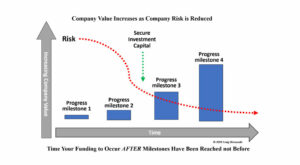If your desire is to be a successful entrepreneur, these are some characteristics you can work on to improve your skills and capabilities.

Entrepreneurs possess a unique perspective on how they view the world around them. When others see problems, entrepreneurs visualize a myriad of solutions. When others spot roadblocks, entrepreneurs picture untapped opportunity. When others encounter challenges and are overcome by cynicism and despondency, entrepreneurs sense motivation rising within them to overcome. Sometimes entrepreneurs may be accused of seeing the world inaccurately through rose-colored glasses. However, those who have a vision of “what could be,” achieve far more than those who believe “they cannot.” All good entrepreneurs should work to gain a balanced view of the real challenges yet not lose sight of their aspiring goals.
I believe that many individuals possess some underlying capabilities for entrepreneurial success. However, for most individuals, certain life events and outcomes, coupled with their belief about the future, have altered their sight. As if wearing a green-tinted, grease-smudged pair of glasses, their eyesight is tainted by a misleading and hazy view of circumstances and a belief about their inability to change them.
There are many characteristics successful entrepreneurs possess, and these are only a few. However, I believe everyone can improve on these skills with focused practice, but it is important to know the target, as a goal without a target is impossible to reach.
6 Characteristics of Successful Entrepreneurs*
1. A driving passion for your work: Be sure to check your internal enthusiasm gauge and determine if you have a passion for what you are doing. When you have passion for your work, it does not feel like work. Be sure that you would do what you do, even if you did not get paid to do it (most entrepreneurs don’t pay themselves in the beginning anyway). If you don’t have passion for what you are doing, none of the other characteristics will make up for the lack of it. Investors will see it, your team member will notice it, and you will not have sufficient motivation to do what needs to be done to be successful. If this is the case, you should re-evaluate the focus of your endeavors, the market you are targeting, the application you are focused on, the people you are partnering with or working with, or the industry you are working in. Once you recover your passion, and get your purpose back on track, it will not be “work” to you.
2. The ability to communicate your vision and inspire others to follow: Good leaders inspire other to follow because they communicate a vision and paint a mental picture of where they want to go. Entrepreneurs have little innate authority over others to get them to do want them to do. However, through inspiration they possess massive influence on others such that they will work harder and longer than if they were simply told to do something. Often the words and manner in which we communicate do not inspire others to follow. Good communication is simply the faithful and accurate transmission of thoughts from one person to another. If you recognize this as a weakness, ask those around you to give you some feedback and what to improve upon or do differently. This may seem difficult, but it is fruitful and leads to characteristic #3.
3. Humility and the desire to learn: The best entrepreneurs are those that have a sense of humility. They don’t think of themselves better than others, rather they think of others as teammates with different responsibilities. Arrogance is the opposite of humility, and arrogant entrepreneurs repel most people because the thought is they don’t need anyone’s help, and they know everything. Humility is difficult to define, but you can sure recognize it when you see it. One characteristic that signifies humility is the ability to learn from anyone and everyone. Make it a habit to practice. For instance, learn from the investor presentation that did not go well rather than being argumentative. Ask them questions about what was missing, what do they see as the weakness of your company, what feedback and advice can they give you? Don’t be afraid to ask clarifying questions and get honest feedback. You are the one that will benefit with the knowledge and wisdom you gain from this exercise.
4. Accepting responsibility and ownership for problems: A good entrepreneurial leader does not blame others, but is introspective, accepts responsibility for the outcome of situation. The entrepreneur looks to see what they can do differently to avoid this in the future and prevent it from happening again. This does not mean there should not be shared responsibly for problems. Just remember that ultimately, success and failure are in the hands of the entrepreneur who accepts ownership for a problem because it is very difficult to fix something you do not own.
5. Perseverance and creativity in the face of adversity: With the certainty of setbacks that the average entrepreneur will experience, it is tempting to want to give up and quit. However, the successful entrepreneur realizes that perseverance, coupled to creative problem-solving are keys to making the outcome better than it would have been without adversity. When you face adversity and you don’t know what to do, seek other people who occupy similar positions and talk to about the problem. Ask lots of questions and learn (see #3) until you can formulate a strategy to overcome the adversity. There is safety in having many mentors.
6. An ability to raise money and manage it well: Without capital, like a car with a near empty gasoline tank, your business will not go far. You should have a well thought-out plan for raising capital and in increments that allow you to achieve your next value-enhancing milestone, so you can raise the next round of capital at an increased valuation. Be sure to allow at least 6-9 months to raise early stage capital, and 9-12 months for latter-stage capital, and include a contingency amount because everything does not always go as planned. Equally important is to carefully manage the capital you do have. It is wise to outsource the activities that are not core to you and your team, but be sure to pick partners, consultants, vendors, suppliers that share the same core values you do, and treat them as your team members.
The term entrepreneur as defined by Merriam-Webster’s Dictionary is “one who organizes, manages, and assumes the risk of the business or enterprise.” In other words, the entrepreneur is the owner and manager of the business risks of the company. One of the most important risks an entrepreneur can manage is to ensure they, themselves, have the skills and abilities to help overcome obstacles they will face during their journey.
Best wishes to you for your continued entrepreneurial success!







